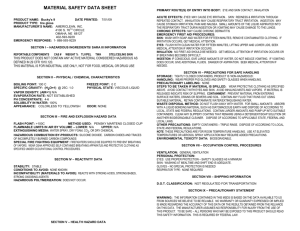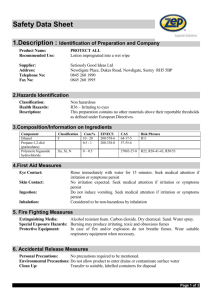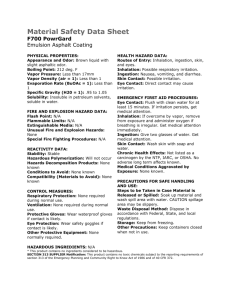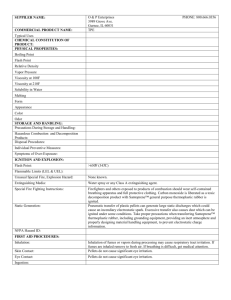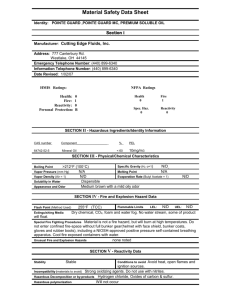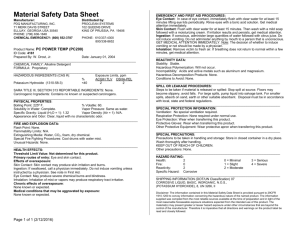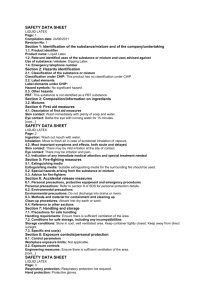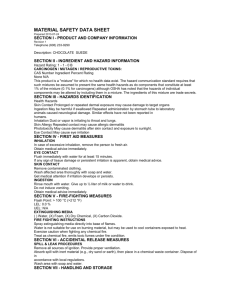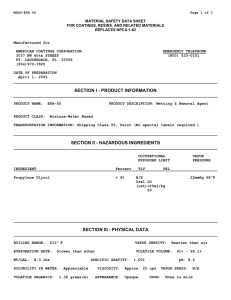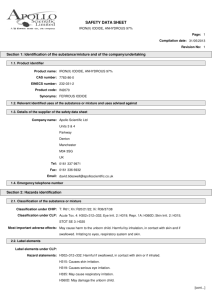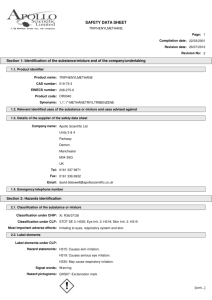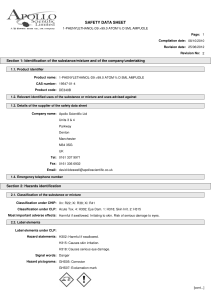SeaClean2 safety information
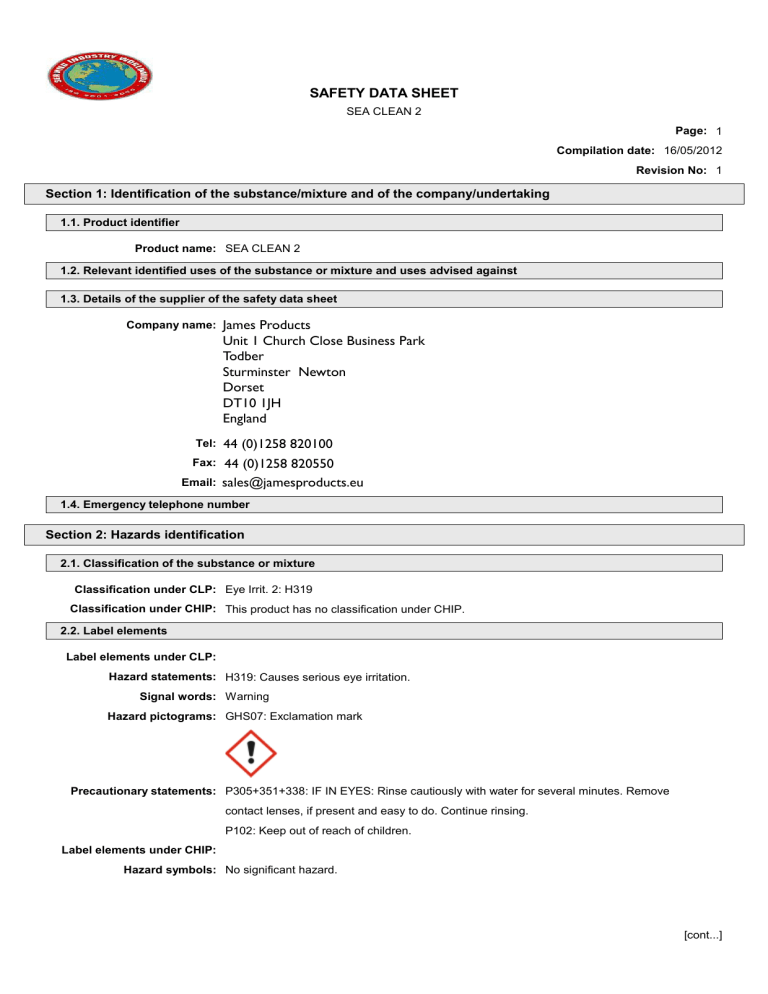
SAFETY DATA SHEET
SEA CLEAN 2
Section 1: Identification of the substance/mixture and of the company/undertaking
1.1. Product identifier
Product name: SEA CLEAN 2
1.2. Relevant identified uses of the substance or mixture and uses advised against
1.3. Details of the supplier of the safety data sheet
Company name:
James Products
Unit 1 Church Close Business Park
Todber
Sturminster Newton
Dorset
DT10 1JH
England
Tel:
Fax:
Email:
44 (0)1258 820100
44 (0)1258 820550 sales@jamesproducts.eu
1.4. Emergency telephone number
Section 2: Hazards identification
2.1. Classification of the substance or mixture
Classification under CLP: Eye Irrit. 2: H319
Classification under CHIP: This product has no classification under CHIP.
2.2. Label elements
Label elements under CLP:
Hazard statements: H319: Causes serious eye irritation.
Signal words: Warning
Hazard pictograms: GHS07: Exclamation mark
Page: 1
Compilation date: 16/05/2012
Revision No: 1
Precautionary statements: P305+351+338: IF IN EYES: Rinse cautiously with water for several minutes. Remove contact lenses, if present and easy to do. Continue rinsing.
P102: Keep out of reach of children.
Label elements under CHIP:
Hazard symbols: No significant hazard.
[cont...]
SAFETY DATA SHEET
SEA CLEAN 2
Page: 2
2.3. Other hazards
PBT: This substance is not identified as a PBT substance.
Section 3: Composition/information on ingredients
3.2. Mixtures
Hazardous ingredients:
1,2,3-PROPANETRICARBOXYLIC ACID, 2-HYDROXY-MONOHYDRATE
-
EINECS CAS
5949-29-1 Xi: R36
CHIP Classification
-
AKLYL POLYGLYCOSIDE
Xi: R36 -
1-HYDROXY-ETHYLIDENE-1,1-DIPHOSPHONIC ACID
2809-21-4 Xi: R41 -
CLP Classification Percent
1-10%
1-10%
<1%
Section 4: First aid measures
4.1. Description of first aid measures
Skin contact: Wash immediately with plenty of soap and water.
Eye contact: Bathe the eye with running water for 15 minutes.
Ingestion: Wash out mouth with water. Do not induce vomiting. If conscious, give half a litre of water to drink immediately. Consult a doctor.
Inhalation: Remove casualty from exposure ensuring one's own safety whilst doing so. Consult a doctor.
4.2. Most important symptoms and effects, both acute and delayed
Skin contact: There may be mild irritation at the site of contact.
Eye contact: There may be irritation and redness.
Ingestion: There may be soreness and redness of the mouth and throat. Inhalation of fumes from the stomach may cause symptoms similar to direct inhalation.
Inhalation: There may be irritation of the throat with a feeling of tightness in the chest. Drowsiness or mental confusion may occur.
Delayed / immediate effects: Immediate effects can be expected after short-term exposure.
4.3. Indication of any immediate medical attention and special treatment needed
Immediate / special treatment: Not applicable.
Section 5: Fire-fighting measures
5.1. Extinguishing media
Extinguishing media: Suitable extinguishing media for the surrounding fire should be used. Use water spray to cool containers.
[cont...]
SAFETY DATA SHEET
SEA CLEAN 2
Page: 3
5.2. Special hazards arising from the substance or mixture
Exposure hazards: In combustion emits toxic fumes.
5.3. Advice for fire-fighters
Advice for fire-fighters: Wear self-contained breathing apparatus. Wear protective clothing to prevent contact with skin and eyes.
Section 6: Accidental release measures
6.1. Personal precautions, protective equipment and emergency procedures
Personal precautions: Refer to section 8 of SDS for personal protection details. If outside do not approach from downwind. Mark out the contaminated area with signs and prevent access to unauthorised personnel. Turn leaking containers leak-side up to prevent the escape of liquid. If outside keep bystanders upwind and away from danger point.
6.2. Environmental precautions
Environmental precautions: Do not discharge into drains or rivers. Contain the spillage using bunding.
6.3. Methods and material for containment and cleaning up
Clean-up procedures: Absorb into dry earth or sand. Transfer to a closable, labelled salvage container for disposal by an appropriate method.
6.4. Reference to other sections
Reference to other sections: Refer to section 8 of SDS.
Section 7: Handling and storage
7.1. Precautions for safe handling
Handling requirements: Ensure there is sufficient ventilation of the area. Do not handle in a confined space.
Avoid the formation or spread of mists in the air.
7.2. Conditions for safe storage, including any incompatibilities
Storage conditions: Store in cool, well ventilated area. Keep container tightly closed.
7.3. Specific end use(s)
Specific end use(s): No data available.
Section 8: Exposure controls/personal protection
8.1. Control parameters
Workplace exposure limits: Not applicable.
8.2. Exposure controls
Engineering measures: Ensure there is sufficient ventilation of the area.
Respiratory protection: Self-contained breathing apparatus must be available in case of emergency.
Hand protection: Protective gloves.
[cont...]
SAFETY DATA SHEET
SEA CLEAN 2
Eye protection: Safety glasses. Ensure eye bath is to hand.
Skin protection: Protective clothing.
Section 9: Physical and chemical properties
9.1. Information on basic physical and chemical properties
State: Liquid
Colour: Green to Blue
Boiling point/range°C: 100
9.2. Other information
Other information: Not applicable.
Section 10: Stability and reactivity
Flash point°C: >93
10.1. Reactivity
Reactivity: Stable under recommended transport or storage conditions.
10.2. Chemical stability
Chemical stability: Stable under normal conditions.
10.3. Possibility of hazardous reactions
Hazardous reactions: Hazardous reactions will not occur under normal transport or storage conditions.
Decomposition may occur on exposure to conditions or materials listed below.
10.4. Conditions to avoid
Conditions to avoid: Heat.
10.5. Incompatible materials
Materials to avoid: Strong oxidising agents. Strong acids.
10.6. Hazardous decomposition products
Haz. decomp. products: In combustion emits toxic fumes.
Section 11: Toxicological information
11.1. Information on toxicological effects
Toxicity values: Not applicable.
Symptoms / routes of exposure
Skin contact: There may be mild irritation at the site of contact.
Eye contact: There may be irritation and redness.
Ingestion: There may be soreness and redness of the mouth and throat. Inhalation of fumes from the stomach may cause symptoms similar to direct inhalation.
Inhalation: There may be irritation of the throat with a feeling of tightness in the chest. Drowsiness or mental confusion may occur.
Delayed / immediate effects: Immediate effects can be expected after short-term exposure.
Page: 4
[cont...]
SAFETY DATA SHEET
SEA CLEAN 2
Page: 5
Section 12: Ecological information
12.1. Toxicity
Ecotoxicity values: Not applicable.
12.2. Persistence and degradability
Persistence and degradability: No data available.
12.3. Bioaccumulative potential
Bioaccumulative potential: No data available.
12.4. Mobility in soil
Mobility: Readily absorbed into soil.
12.5. Results of PBT and vPvB assessment
PBT identification: This substance is not identified as a PBT substance.
12.6. Other adverse effects
Section 13: Disposal considerations
13.1. Waste treatment methods
Disposal operations: No data available.
NB: The user's attention is drawn to the possible existence of regional or national regulations regarding disposal.
Section 14: Transport information
Transport class: This product does not require a classification for transport.
Section 15: Regulatory information
15.1. Safety, health and environmental regulations/legislation specific for the substance or mixture
15.2. Chemical Safety Assessment
Chemical safety assessment: A chemical safety assessment has not been carried out for the substance or the mixture by the supplier.
Section 16: Other information
Other information
Other information: This safety data sheet is prepared in accordance with Commission Regulation (EU) No
453/2010.
* indicates text in the SDS which has changed since the last revision.
Phrases used in s.2 and 3: H319: Causes serious eye irritation.
R36: Irritating to eyes.
R41: Risk of serious damage to eyes.
Legal disclaimer: The above information is believed to be correct but does not purport to be all inclusive
[cont...]
SAFETY DATA SHEET
SEA CLEAN 2 and shall be used only as a guide. This company shall not be held liable for any damage resulting from handling or from contact with the above product.
Page: 6
[final page]
